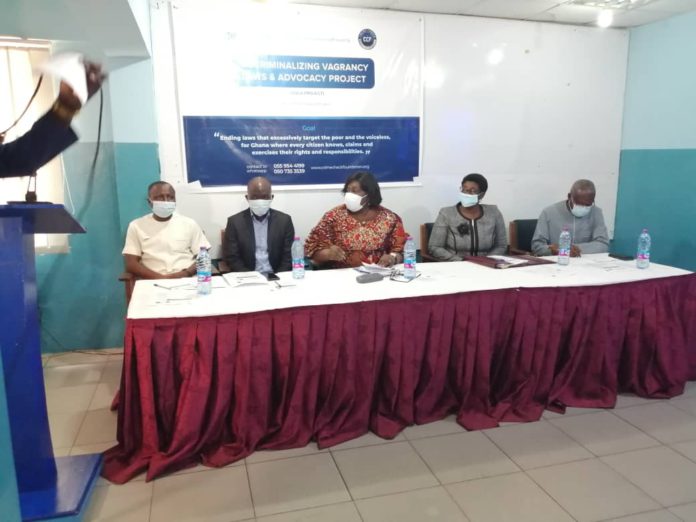
The Open Society Initiative for West Africa (OSIWA) and the Crime Check Foundation (CCF) have rolled out an initiative in their quest to end laws that criminalize the social status of citizens.
The partnership, dubbed ‘Decriminalizing Vagrancy Laws and Advocacy’ project was launched on Friday, May 28, 2021, at the Ghana International Press Centre in Accra.
The law, known as the vagrancy law, criminalises the status of individuals as being poor, homeless, as opposed to specific wrongful acts during court sentencing and trials.
The Executive Director of CCF, Ibrahim Oppng Kwarteng, speaking at the launch, reiterated the outfit’s commitment to embark on social interventions that will contribute to the well-being of people.
He explained the new partnership with OSIWA seeks to create an enabling environment for vagrants to know, demand, and exercise their rights and responsibilities in Ghana.
The project, he added, will also seek to promote justice for the poor and voiceless citizens.
“Our MMDAs are mandated to implement our by-laws but what we have realised is that these vagrants are regularly caught up with it because they are not enlightened.
ALSO READ:
“They are, therefore, subjected to unreasonable punishments, including fines and imprisonment beyond their strength for carrying out activities as hawkers, petty traders which lead to unlawful incarceration of such persons,” he said.
He noted the intervention at the moment will start in 12 Metropolitan, Municipal and District Assemblies (MMDAs) in the Greater Accra, Ashanti and Central Regions of Ghana.
Appeals Court Judge, Justice Sophia Rosetta Bernasko Essah, who spoke on behalf of the Chief Justice, Anin Yeboah, said the court has been enlightened on the concept of vagrancy through the project.
“We on the bench are guided by sentencing guidelines and policies but within that we have a discretion but when we are sensitised on this concept of vagrancy, the effect of some of these sentences we pull on certain persons then we are better able to exercise our discretion positively.
“We all know that there are very few people who desire to be homeless and I think it violates the tenets to jail someone based on our financial catastrophe and against human, societal rights and if society has somehow played a part in making people vagrant, then it beholds on all of us to play our parts to make sure that the less-privileged do not suffer,” she said.
Going further, she pledged their support to make the initiative a success, adding it will guide their sentences in the courtroom.
“I assure you that I will take all I have been imbibed here, the concerns and the various aspects of the vagrancy laws, situations and communicate it to the chief justice and other authorities.
“So that we are made aware and sensitised about it to the extent that we do not make others suffer as a result of the kind of sentences we give,” she assured.
The Public Relations Officer of the Prisons Service, Chief Supt Courage Atsem, who also graced the occasion, said the project will help to broaden and review the scope of sentencing in Ghana.
He added that such interventions will go a long way to decongest Ghana’s prisons and ensure the use of non-custodial sentencing


![Crime Check launches Meena Breast Cancer Awareness Project [Photos]](https://www.adomonline.com/wp-content/uploads/2022/10/image-94-218x150.png)


